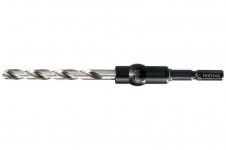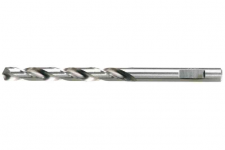I have the opportunity to purchase a brand new (old stock) installers kit at a price that I’d be irresponsible to not buy. The kit comes with the set of HSS twist drill bits from 3-8mm in 0.5mm increments, as well as 28 replacement bits. The kit also has the set of 5 full length brad point bits (3,4,5,6 and 8mm). This was a handy find as I’m in the process of changing my drills to Festool, and therefore taking advantage of the centrotec system.
Now, I prefer brad point bits as I’ve pretty much always used them and I only work in wood. I do have twist drill bits, including my countersink, but I reach for my brad points when I can. They’re not the best quality, and I got random sets with either broken or misplaced bits. I just like how accurate they are with points, especially when drilling multiple holes.
I don’t do all that much drilling/screwing but when I do, I want excellent results. So I’m thinking of buying the remaining brad point bits that I need, 7,9, and 10mm and potentially selling the twist drill bits and with the money, buying the in between sizes. The problem is, I don’t think, or at least I can’t find here in Australia, Festool brad point bits that are in 0.5mm sizes, eg 6.5mm. The other option I considered was buying the imperial set which would give me a slight variation with the metric.
So my questions are, does anyone use twist drill bits exclusively in wood? And if so, why do you choose them over brad points.
Also, what options are there for centrotec brad point bits that are non Festool? I looked at the famag set but couldn’t tell if they were centrotec or not.
Thanks,
Andy
Now, I prefer brad point bits as I’ve pretty much always used them and I only work in wood. I do have twist drill bits, including my countersink, but I reach for my brad points when I can. They’re not the best quality, and I got random sets with either broken or misplaced bits. I just like how accurate they are with points, especially when drilling multiple holes.
I don’t do all that much drilling/screwing but when I do, I want excellent results. So I’m thinking of buying the remaining brad point bits that I need, 7,9, and 10mm and potentially selling the twist drill bits and with the money, buying the in between sizes. The problem is, I don’t think, or at least I can’t find here in Australia, Festool brad point bits that are in 0.5mm sizes, eg 6.5mm. The other option I considered was buying the imperial set which would give me a slight variation with the metric.
So my questions are, does anyone use twist drill bits exclusively in wood? And if so, why do you choose them over brad points.
Also, what options are there for centrotec brad point bits that are non Festool? I looked at the famag set but couldn’t tell if they were centrotec or not.
Thanks,
Andy


